Iran-North Korea's 'axis of evil' may be Trump's biggest threat
Clay Dillow
With sanctions and rhetoric, President Donald Trump may be pushing North Korea and Iran closer together. On Wednesday, while in Seoul on his Asia tour, three U.S. aircraft carrier strike groups displayed military strength nearby, while Trump gave dire warnings to North Korea's leader to abandon nuclear weapons. "Do not underestimate us, and do not try us," Trump said while addressing the National Assembly. It's a dangerous game of brinkmanship.
In refusing to certify Iranian compliance with the JCPOA — the Joint Comprehensive Plan of Action, otherwise known as the Iran nuclear deal — the Trump administration hopes to keep Iran from becoming another nuclear armed adversary state.
But experts say that by walking away from the Iran accord while simultaneously trying to coax North Korea back to the negotiating table, the Trump administration doesn't just risk undermining its own efforts to strike a deal with Kim Jong Un's regime over its nuclear and ballistic missile programs. The president also risks pushing the two pariah states closer together, potentially rekindling a collaborative military-to-military relationship that reaches back decades and heightening the prospect that ballistic missile and nuclear weapons technologies will proliferate. It is a relationship former President George W. Bush coined "the axis of evil."
But experts say that by walking away from the Iran accord while simultaneously trying to coax North Korea back to the negotiating table, the Trump administration doesn't just risk undermining its own efforts to strike a deal with Kim Jong Un's regime over its nuclear and ballistic missile programs. The president also risks pushing the two pariah states closer together, potentially rekindling a collaborative military-to-military relationship that reaches back decades and heightening the prospect that ballistic missile and nuclear weapons technologies will proliferate. It is a relationship former President George W. Bush coined "the axis of evil."
The result: a worsening security situation in the Asia-Pacific region and a fresh nuclear crisis in the Middle East, one likely to prompt Saudi Arabia and its regional allies to consider acquiring their own nuclear capabilities in response. Right now Saudi Arabia is party to the Treaty on the Non-Proliferation of Nuclear Weapons. The scenario is neither far-fetched nor far off, says Dr. Jeffrey Lewis, director of the East Asia Nonproliferation Program at the Middlebury Institute of International Studies at Monterey in California.
"If we walk away from this deal with the Iranians, they can do everything North Koreans have done and more," he says. "And they can do it much, much faster."
"If we walk away from this deal with the Iranians, they can do everything North Koreans have done and more," he says. "And they can do it much, much faster."
The enemy of my enemy
While the opaque nature of the Iranian and North Korean regimes make it difficult for Western analysts to monitor the relationship between them, military ties between the two states go back as far as the 1980s. Iran — then locked in conflict with neighboring Iraq and suffering under an arms embargo — needed missiles. North Korea obliged, supplying Iran with hundreds of Soviet-designed Scud-B and Scud-C ballistic missiles. Iran renamed their new missiles (Shahab-1 and Shahab-2) and used the technology to seed its own ballistic missile research and development.As the two nations pursued their own ballistic missile programs independently, they also shared technical information and know-how. While it remains unclear exactly what was shared, there are two key points on which defense analysts are confident. First, emerging Iranian and North Korean missile systems continue to exhibit similar characteristics (the second stage of North Korea's alleged intercontinental ballistic missile, for instance, looks a lot like one of the upper stages of an Iranian space launch rocket), suggesting some degree of ongoing cooperation. Second, high-ranking Iranian scientists and military officers have reportedly attended and observed many of North Korea's missile and nuclear tests over the past two decades, underscoring the two regimes' continued military ties.
"It's possible they're just there in the bleachers watching these things for the entertainment, but I doubt it," says Tom Karako, senior fellow and director of the Missile Defense Project at the Center for Strategic and International Studies. "I suspect when you see high-ranking Iranian officials at a military parade in Pyongyang, or at missile test exercises, they're not there for the Korean food."
The extent of the relationship and of the technological collaboration that may be taking place remains difficult to quantify. While it's known that the two states have historically cooperated on the development of ballistic missile technology — and "we think there's still quite a bit of back-and-forth on the missile side," Lewis says — there exists no concrete evidence that their nuclear programs have ever enjoyed the same cozy relationship.
However, it's not out of the question that some exchange of nuclear know-how has occurred in the past or that it may occur in the future — particularly if both states find themselves increasingly isolated.
However, it's not out of the question that some exchange of nuclear know-how has occurred in the past or that it may occur in the future — particularly if both states find themselves increasingly isolated.
Crisis of credibility
The Trump administration's decision not to certify Iranian compliance with the JCPOA isn't just a blow to Iran, which by all accounts has kept up its end of the deal as spelled out in the text of the agreement. North Korea is watching closely to see how the administration's dealings with Iran over the JCPOA proceed.
"North Korea has already learned its lesson in terms of it being very difficult for agreements to last from presidential administration to presidential administration," says Jenny Town, assistant director of the US-Korea Institute and managing editor of 38 North. In 2003, for instance, the Agreed Framework — an agreement signed under the Clinton administration in 1994 aimed at freezing North Korea's nuclear program and normalizing U.S.-North Korean relations — broke down. Each country blamed the other (and both countries shared the blame), but a major takeaway for North Korea and other countries was that the United States can't maintain such agreements beyond a single presidency.
The experiences of other states that entered disarmament agreements with the United States further buttress North Korea's skepticism, Lewis says. Both Saddam Hussein of Iraq and Muammar Gaddafi of Libya entered into agreements to give up certain kinds of weapons programs, for instance. Neither regime remains, and both leaders are dead.
"If you're the North Koreans, you would have to be freaking insane to give up your nuclear weapons," Lewis says. "There is exactly zero evidence that the United States is going to keep its word. And it hurts me to say that; it's upsetting, because I desperately want diplomacy to work."
If diplomacy fails in Iran, North Korea will prove that much more reticent to engage in diplomatic negotiations with the United States over its own nuclear and ballistic missile programs. As for Iran, an unraveling of the JCPOA could prompt the Iranian government to reboot its nuclear program. Once that happens, a nuclear-armed Iran is likely much closer than many people think, Lewis says.
The country has already demonstrated multiple medium-range ballistic missiles, including a new weapon first demonstrated in September with a range of about 1,200 miles and the ability to carry several warheads, according to an Iranian government announcement. If it were to reconstitute its nuclear program, Iran's path to a missile-deliverable weapon would be measured in years, not decades.
The experiences of other states that entered disarmament agreements with the United States further buttress North Korea's skepticism, Lewis says. Both Saddam Hussein of Iraq and Muammar Gaddafi of Libya entered into agreements to give up certain kinds of weapons programs, for instance. Neither regime remains, and both leaders are dead.
"If you're the North Koreans, you would have to be freaking insane to give up your nuclear weapons," Lewis says. "There is exactly zero evidence that the United States is going to keep its word. And it hurts me to say that; it's upsetting, because I desperately want diplomacy to work."
If diplomacy fails in Iran, North Korea will prove that much more reticent to engage in diplomatic negotiations with the United States over its own nuclear and ballistic missile programs. As for Iran, an unraveling of the JCPOA could prompt the Iranian government to reboot its nuclear program. Once that happens, a nuclear-armed Iran is likely much closer than many people think, Lewis says.
The country has already demonstrated multiple medium-range ballistic missiles, including a new weapon first demonstrated in September with a range of about 1,200 miles and the ability to carry several warheads, according to an Iranian government announcement. If it were to reconstitute its nuclear program, Iran's path to a missile-deliverable weapon would be measured in years, not decades.
"The Iranians could go really fast," he says, as many of the enabling technologies that once made nuclear weapons development so taxing—things like high-quality fiber-optic cables and neutron generators — are now available off the shelf commercially. "They're not going to start with some lousy fission device. They'll go straight to a missile-deliverable nuclear weapon, and then they'll follow that with a thermonuclear weapon, and it will happen so fast it will make our heads spin."
Proliferation threat
Many critics of Trump's recent actions on the Iran accord have warned that allowing the agreement to unravel would likely lead to a nuclear-armed Iran — another member of the nuclear club with an unfriendly disposition toward the United States and its interests. But if U.S. action on the JCPOA also drives the United States further from some kind of negotiated, diplomatic solution with North Korea, nuclear weapons technology and ballistic missile capabilities could proliferate further than Iran as the hermit kingdom seeks cash to prop up its regime.
"One has to ask oneself: On what basis do you believe the North Koreans are constrained?" Karako says. "On what basis would you conclude that they are self-constrained from transferring anything to anybody if they can get away with it?"
North Korea does care about how it is perceived on the international stage, says the U.S.-Korea Institute's Town. But if the regime finds itself cut off from formal international trade arrangements and short on hard currency reserves—an increasing risk as tightening trade sanctions imposed by the U.S. and China choke off North Korea's traditional trading relationships—there's no guarantee that the country's leadership would not sell weapons or technology in an effort to ensure the regime's survival.
"Before they collapse, they're going to look for ways to find money, and if it's not in commercial trade, they have other options they will exercise," she says. "If we keep pushing them in a certain direction, we have to expect that eventually they'll go in that direction."
That's why the United States and others in the international community need to get the North Koreans back to the negotiating table, she says, and fast.
"No matter how hard negotiations are, even if the end goal is not reached in any near future, it's going to put us back on a path that is safer than the one we're on right now," Town says. "The path we're on is a path toward conflict. There's only a few ways to backtrack from this, and they all start with getting back to the negotiating table."
Finding a way to bring nations like Iran and North Korea into international agreements that actually stick will become increasingly imperative, Lewis says, as the technical barriers between states and nuclear weapons continue to fall. "Our general approach of export controls and sanctions, while they may help, cannot substitute for diplomatic solutions," he says. "Because if a country really wants to [develop a nuclear weapon], they can do it."
North Korea does care about how it is perceived on the international stage, says the U.S.-Korea Institute's Town. But if the regime finds itself cut off from formal international trade arrangements and short on hard currency reserves—an increasing risk as tightening trade sanctions imposed by the U.S. and China choke off North Korea's traditional trading relationships—there's no guarantee that the country's leadership would not sell weapons or technology in an effort to ensure the regime's survival.
"Before they collapse, they're going to look for ways to find money, and if it's not in commercial trade, they have other options they will exercise," she says. "If we keep pushing them in a certain direction, we have to expect that eventually they'll go in that direction."
That's why the United States and others in the international community need to get the North Koreans back to the negotiating table, she says, and fast.
"No matter how hard negotiations are, even if the end goal is not reached in any near future, it's going to put us back on a path that is safer than the one we're on right now," Town says. "The path we're on is a path toward conflict. There's only a few ways to backtrack from this, and they all start with getting back to the negotiating table."
Finding a way to bring nations like Iran and North Korea into international agreements that actually stick will become increasingly imperative, Lewis says, as the technical barriers between states and nuclear weapons continue to fall. "Our general approach of export controls and sanctions, while they may help, cannot substitute for diplomatic solutions," he says. "Because if a country really wants to [develop a nuclear weapon], they can do it."
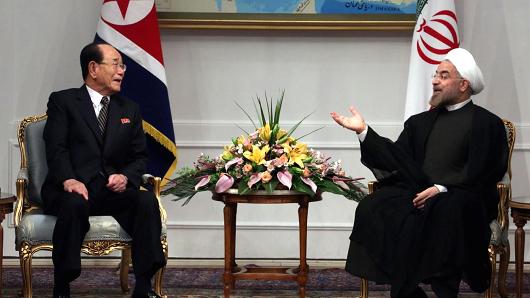
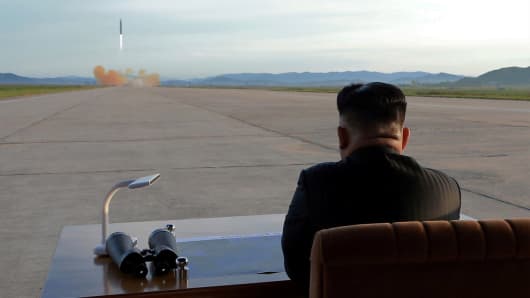
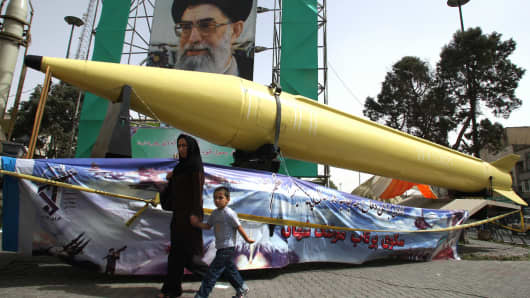
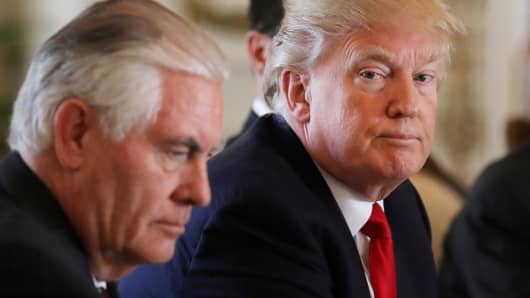
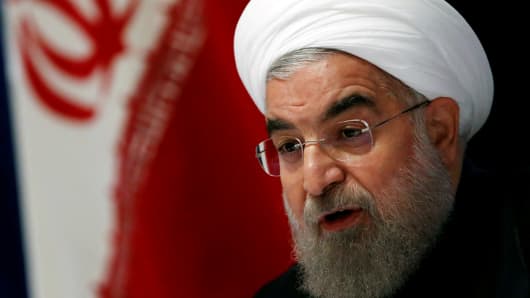
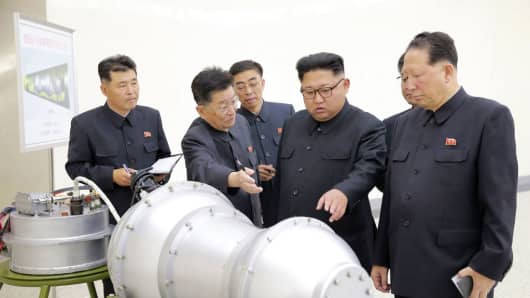
No comments:
Post a Comment